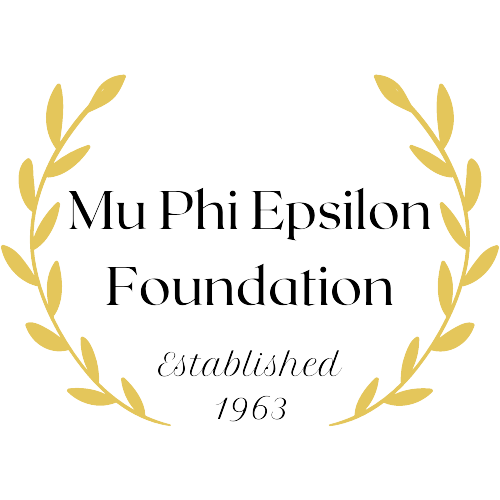Proposals and Statements
Your application to Mu Phi Epsilon Foundation scholarships, grants, and awards may require you to prepare one or more statements or proposals. These statements and proposals help judges to understand who you are and what you hope to accomplish, if you are selected to receive a scholarship, grant, or award. Below, you will find information on several types of statements and proposals that are commonly found as part of the applications.
Frequently Required Statements
Statement of Mu Phi Epsilon Participation (100-250 words)
All applications require a “Statement of Mu Phi Epsilon Participation. In this statement, you should highlight for judges for how long and in what ways you have participated in the work of Mu Phi Epsilon. This is your chance to show the judge that you are a dedicated member!
You should include information such as:
How long you’ve been a member and at what level(s) (e.g., collegiate, alumni, etc.)
Any leadership roles you’ve held with the organization (e.g., president, treasurer, etc.)
Any special projects you’ve been involved in (e.g., chapter service projects, etc.)
How you plan to participate in Mu Phi Epsilon in the future
If you’ve only recently joined the organization, it may feel like you don’t have a lot to say here. However, you can lean into the last bullet point above and expand on what path you think you’ll take with Mu Phi Epsilon – are you hoping to hold a leadership position? Which one and why? Do you have an idea for a service project for the coming years? Tell us how you plan to participate!
Proposals for Projects, Programs of Study, Professional Opportunities, or other Activities (250-500 words)
Many scholarships and grants aim to support specific projects or activities in specific subject areas. Applications to these scholarships and grants will often require a proposal, which should include the following:
Description of the project or opportunity (e.g., the “what”)
Timeline and plan for completion (e.g., the “how”)
Importance or impact (i.e., the “why”)
Additional relevant information or materials (e.g., applicant training and skills related to the project, study program materials, etc.)
While most proposals will describe specific projects, proposals may also relate to educational or professional development opportunities, study, travel, research, publication, recording, performance or other activities. The guidelines above still apply! A strong proposal, whether for a specific project or otherwise, will describe what the opportunity is, how it will be completed, and why it is significant to the applicant’s development.
Statement of Financial Need (250-500 words)
This statement is an opportunity for you to highlight the unique circumstances that contribute to your need for financial support. Although a budget is likely also required in the application, this statement acts as a supplement to the budget. The budget clearly outlines how you will use the money, if received; the statement of financial need explains why you may benefit from this money more than others due to your specific financial situation. Some ways you may demonstrate financial need include:
Reliance on other grants and loans to cover expenses (e.g. to cover educational, musical, or other expenses) due to lack of other resources (e.g., family support, specific arts funding, etc.)
Employment circumstances (e.g., having to work to pay for school, working at a Title I school)
Existing debt (e.g., educational loans)
Recipient of other support given based on financial need (e.g., Federal work-study eligible, Pell grant recipient, etc.)
Other personal situations that can cause financial strain (e.g., single parent, first generation college student, etc.)
As you prepare your statement of financial need, focus on sharing your story – what circumstances impact your ability to pay for the project or opportunity that is the focus of your application? Be sure to provide concrete examples of your financial situation (e.g., amount of financial assistance you’ve received, outstanding debt, etc.) and describe any additional ways you are planning to cover the costs related to project or opportunity (e.g., other scholarships, financial aid, grants from arts organizations, etc.) This website contains additional tips and examples of financial need statements.
Statement of Goals as an Educator (250-500 words)
This statement is required of most applications to our music education scholarships and grants. A strong statement of goals as an educator will:
provide a brief overview of the core tenets of your teaching philosophy
give examples of your teaching effectiveness
demonstrate your commitment to teaching excellence
Even early career educators and those still in teacher training (e.g., student teachers, those pursuing an undergraduate degree in music education) should be able to outline the main goals of their teaching and provide examples from fieldwork, private teaching, or other educational work within the written statement.
Brief Professional Bio (100 words max)
This bio should provide a brief snapshot of your professional career. You should include your educational background, specific degrees earned or in progress, relevant honors and awards, or other distinguishing features of your professional work.
Other Statements
Applications to Mu Phi Epsilon Foundation scholarships, grants, and awards may ask for a variety of other short statements, which will help judges to assess how you will use the funds, if you receive them. For instance, some scholarships ask you to create a statement describing how the funds will help you to attain your career goals; in this case, you should clearly outline what your career goals are, what sorts of funding you will need to achieve these career goals, and how the specific scholarship, grant, or award will contribute to those goals. In other statements, you may be asked to describe your current or future programs of study and how the funds will help to support your education.
If you are in doubt about what to include in your statements, please reach out to the Scholarship & Grant coordinator at grants@mpefoundation.org, or to the specific scholarship chair, for more information. We are here to help!
